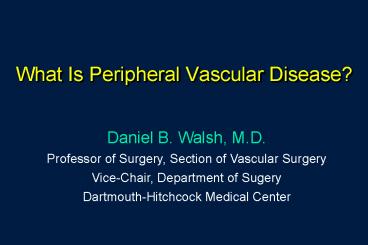What Is Peripheral Vascular Disease PowerPoint PPT Presentation
1 / 34
Title: What Is Peripheral Vascular Disease
1
What Is Peripheral Vascular Disease?
Daniel B. Walsh, M.D. Professor of Surgery,
Section of Vascular Surgery Vice-Chair,
Department of Sugery Dartmouth-Hitchcock Medical
Center
2
Perhipheral vascular disease is considered to be
any abnormality of the arteries and veins outside
of the skull and the heart.
3
Differences Between Arteries Veins
4
Components
- Problems with veins
- Varicose veins
- Blood clots and sequelae
- Arterial Aneurysms
- Aorta and branches
- Arteries blocked by atherosclerosis
- Carotid, Legs. Kidneys, GI tract
5
Risk Factors for Atherosclerosis
Dyslipidemia
Hyperhomocysteinemia
Diabetes
Hypertension
Smoking
Obesity
Age
Atheroscleroris
Genetics
Atherosclerotic Disease and Complications (coronar
y, cerebrovascular, peripheral arterial events
6
(No Transcript)
7
(No Transcript)
8
Natural History of PAD in US Population
Population Aged gt55y
Asymptomatic ABI lt0.9 10
Intermittent claudication 5
Critical leg ischemia 1
Cardiovascular morbidity/mortality
PAD outcomes
(5-year outcomes)
Stable claudication 73
Leg bypass surgery 7
Major amputation 4
Worsening claudication 16
Nonfatal events (MI/stroke) 20
Mortality 30
Adapted from Weitz JI. Circulation
1996943026-49.
9
Intervention for Tissue Loss/Rest Pain, Severe
Claudication
- Medications
- Risk factor assessment reduction
- Exercise program
- PTA/Stents
- Operation
10
(No Transcript)
11
Aneurysms can occur in these arteries
- Carotid
- Subclavian
- Thoracic
- INFRARENAL
- Renal
- Hypogastric
- Iliac
- Femoral
- Popliteal
12
What is an Aortic Aneurysm?
Abdominal Aortic Aneurysm (AAA)
Thoracic Aortic Aneurysm (front view)
13
(No Transcript)
14
(No Transcript)
15
(No Transcript)
16
(No Transcript)
17
(No Transcript)
18
(No Transcript)
19
(No Transcript)
20
(No Transcript)
21
Endovascular Aortic Aneurysm Repair
Pre-repair
Post-repair
22
Freedom from Re-InterventionDHMC vs EUROSTAR
Freedom from Re-Intervention
Eurostar Data Registry, Jan.2001
23
First Successful CEA
C. Rob
F. Eastcott
May 19, 1954
24
Carotid Atherosclerosis
25
Proven Benefit of CEA
Percent 30 Day Stroke, Death Late Ipsilateral
Stroke
4 Randomized Trials gt 12,000 patients Relative
risk reduction Symptomatic 50-69 -
25 70-99 - 61 Asymptomatic 60-99 - 48
2 Year
3 Year
5 Year
5 Year
Symptomatic
Asymptomatic
26
Selective carotid injection
27
(No Transcript)
28
(No Transcript)
29
(No Transcript)
30
Acculink 6-8x40mm
31
Summary
- 3D CTA can be used to screen high risk CAS
patients better served with modified CAS, CEA, or
medical management
32
Comparison of Carotid Endarterectomy and
StentDartmouth Experience (2000-Present)
Endarterectomy Stent
- Number 366 173
- Stroke 0.5 2.9
- Myocardial Infarct 4 1.2
- Death 0.8 0.8
33
Conclusions
- CEA remains the gold standard RX
- CAS risk increases with age and requires EPD
- Carotid stent treatment of extracranial carotid
occlusive disease is safe in selected patients. - ? Asymptomatic medical high risk
- 3D CTA can assist in selecting patients for CAS
- Need to be prepared to handle technical
difficulties - Know when to stop
- Long-term durability of the procedure needs to be
determined
34
(No Transcript)

